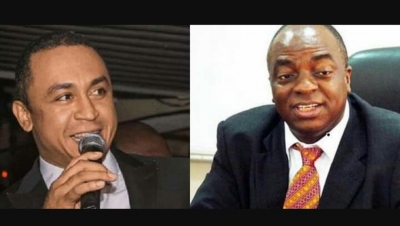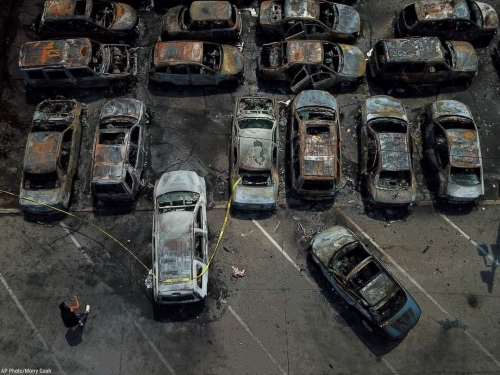Pauplin
Others : I'm Ilesanmi Paul Temitope. I Am A Mariner (Marine Engineer)
Wants to meet Just Friends
Articles
142
Followers
30
profile/743IMG_20200816_193129.jpg
Pauplin

Daddy Freeze Finally Asks Oyedepo For Forgiveness
~0.9 mins read
Popular Broadcaster, Ifedayo Olarinde aka Daddy Freeze, has apologised to the founder of Living Faith Church aka Winners Chapel, David Oyedepo over his provocative words on the latter.
Daddy Freeze, while apologising to Oyedepo, said he insulted the cleric two years ago, adding that the video only went viral recently.
“My attention has been drawn to a video I released circa two years, seven months ago while addressing some pertinent issues that arose back then. I apologise for the delivery of my message and for any insult to Bishop David Oyedepo in that video as I didn’t in any way intend to dishonour, disrespect or disregard the person of the bishop.
“The perceived intention to the contrary is regretted. My methods of addressing doctrinal issues have long since devolved to a more scriptural and less confrontational approach. I was, and still, very passionate in my quest to address what I believe are unresolved doctrinal issues, however, from a more amiable perspective,†he said.
profile/743IMG_20200816_193129.jpg
Pauplin

Kenosha Car Dealership Targeted By Rioters During Overnight Protest.
~2.8 mins read
A Kenosha, Wis., car dealership was targeted by rioters during protests overnight in the wake of the police-involved shooting of a Black man that was caught on video and circulated on social media.
The parking lot that typically stores a local business’s selection of used cars was instead filled with rows of the vehicles’ metal remains hours after rioters took to the streets in and around the city’s downtown area, according to several images shared on social media.
Kenosha was an auto manufacturing center for more than 100 years before transforming into a bedroom community given its location almost directly in between Milwaukee and Chicago.
Multiple reports identified the lot as belonging to Car Source, a pre-owned vehicle dealership located on Sheridan Avenue. Local affiliate FOX 6 reporter Cassidy Williams shared photographs of the charred remnants of cars left in the parking lot, which is located just blocks from Kenosha County Courthouse.
Prior to the overnight destruction, Car Source had more than 140 vehicles available for sale, according to its website.
A spokesperson for Car Source did not immediately respond to Fox News’ request seeking comment, but CBS Chicago reporter Vi Nguyen described how the owners “are devastated.â€
Hours earlier, Drew Hernandez, a reporter who uses the Twitter handle @livesmattershow, shared videos showing a progression of demonstrators’ destruction of Car Source as well as other businesses and property in the city.
First, around 2:20 a.m., Hernandez posted footage of what appeared to be a flaming flare positioned under a seat in the back of an open vehicle.
Just 10 minutes later, the truck appeared to have gone up in flames, with the fire extending to neighboring vehicles, the subsequent footage shows.
A different video appears to show multiple fires set throughout the car lot as car horns and loud bangs can be heard blaring in the background.
The fire continues to spread farther throughout the parking lot as smoke billows from the area and at least one small explosion can be seen, another one of Hernandez’s video shows.
The city's downtown area was closed Monday "due to damage sustained during last night's civil unrest," according to a post on Kenosha County Government's Facebook.
Demonstrators were protesting the police-involved shooting of Jacob Blake, a Black man, from approximately 5 p.m. Sunday.
Democratic Gov. Tony Evers condemned the shooting of 29-year-old Blake, who was hospitalized in serious condition. The three officers at the scene were placed on administrative leave, standard practice in a shooting by police, while the state Justice Department investigates.
The shooting was captured from across the street on cellphone video that was posted online.
In the footage, Blake walks from the sidewalk around the front of his SUV to his driver-side door as officers follow him with their guns pointed and shout at him. As Blake opens the door and leans into the SUV, an officer grabs his shirt from behind and opens fire while Blake has his back turned.
Seven shots can be heard, though it isn’t clear how many struck Blake or how many of the officers fired. During the shooting, a Black woman can be seen screaming in the street and jumping up and down.
“While we do not have all of the details yet," the governor said in a statement, "what we know for certain is that he is not the first Black man or person to have been shot or injured or mercilessly killed at the hands of individuals in law enforcement in our state or our country.â€
Laquisha Booker, who is Blake’s partner, told NBC’s Milwaukee affiliate, WTMJ-TV, that her and Blake’s three children were in the backseat of the SUV when police shot him.
Online court records indicate Kenosha County prosecutors charged Blake on July 6 with third-degree sexual assault, trespassing and disorderly conduct in connection with domestic abuse. An arrest warrant was issued for Blake the following day.
The records contain no further details and do not list an attorney for Blake.
Advertisement

Link socials
Matches
Loading...
